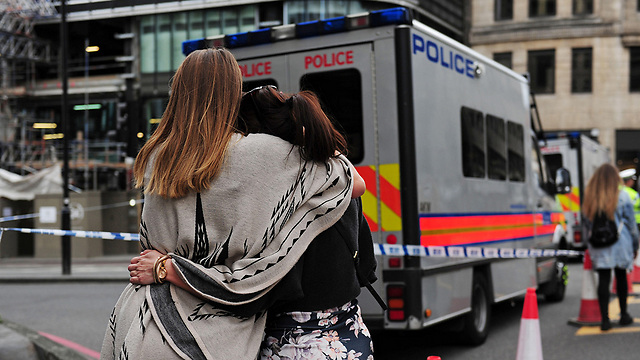A Month of Islam and Multiculturalism in Britain: May 2017
Soeren Kern/Gatestone Institute/June 26/2017
“The whole system failed and that is what has been happening for the last 30 years. And it is PC. People are just too, too afraid to, you know, just too, too afraid to speak the truth.” — Mohan Singh, founder of the Sikh Awareness Society.
MI5, Britain’s domestic security agency, revealed that it has identified 23,000 jihadist extremists living in the country.
Manchester bomber Salman Abedi used taxpayer-funded student loans and benefits to bankroll the terror plot, according to the Telegraph. Abedi is believed to have received thousands of pounds in state funding in the run-up to the attack even while he was overseas receiving bomb-making training. It also emerged that the chief imam of Abedi’s mosque fought with militants in Libya. The mosque was also reported to have hosted hate preachers who called for British soldiers to be killed and non-believers to be stoned to death.
“It is no secret that Saudi Arabia in particular provides funding to hundreds of mosques in the UK, espousing a very hardline Wahhabist interpretation of Islam. It is often in these institutions that British extremism takes root.” — Tom Brake, Lib Dem foreign affairs spokesman.
May 1. Army cadets in Scotland were warned not to wear their uniforms in public because they could be targeted by jihadists.
May 1. Three female teenagers were arrested in East London on terrorism charges. The arrests were in connection with an anti-terror operation in London on April 27 in which a woman wearing a burqa was shot by police. Police said that an active terror plot had been foiled.
May 2. Samata Ullah, a 34-year-old jihadist from Cardiff, was sentenced to eight years in prison for five terror offenses, including membership of the Islamic State, as well being involved in training terrorists and preparing for terrorist acts. Ullah, a British national of Bangladeshi origin, was a key member of a group calling itself the “Cyber Caliphate Army” and gave other members of IS advice on how to communicate using sophisticated encryption techniques.
May 3. Damon Smith, a 20-year-old convert to Islam, was found guilty of making a bomb filled with ball bearings and leaving it on a subway train in London. Jurors at the Old Baily court were told that Smith had downloaded an al-Qaeda article entitled, “Make a bomb in the kitchen of your Mom,” which contained step-by-step instructions on how to make a homemade bomb. The court also heard that Smith had a keen interest in Islam, guns and explosives, and had collected pictures of extremists, including the alleged mastermind of the 2015 Paris terror attacks. Smith, who suffers from autism, admitted to making the device but claimed he only meant it as a prank.
May 3. The trial began of four Muslim men who gang-raped a 16-year-old girl in Ramsgate, Kent. The girl was attacked when she got lost after a night out and asked for directions at a Kebab shop. Restaurant owner Tamin Rahani, 37, Rafiullah Hamidy, 24, Shershah Muslimyar, 20, and an unnamed teenager are accused of taking turns raping the girl in an apartment above the restaurant.
May 9. Aine Davis, a 33-year-old British convert to Islam, was sentenced to seven-and-a-half years in prison by a court in Turkey for being a member of the Islamic State. The BBC reported that Davis was one of a four-man IS cell nicknamed “The Beatles” responsible for beheading more than two dozen hostages in Syria. Davis, the only one of the group to face a trial, had denied the charges against him. Davis left his home in West London in 2013 to join the Islamic State. His wife, Amal El-Wahabi, after a trial at the Old Bailey court, was jailed in November 2014 for funding his terrorism.
May 11. A mother and daughter, along with another woman, appeared at Westminster magistrates’ court on charges of plotting a jihadist attack near the British Parliament. Mina Dich, 43, her daughter Rizlaine Boular, 21, and Khawla Barghouthi, 20, are accused of plotting a random knife attack. Dich and Boular appeared in court wearing burkas covering their faces. Chief Magistrate Emma Arbuthnot asked them to lift their veils to reveal their eyes when they were identified in the dock. Barghouthi wore a niqab with her face showing. All three are accused of conspiracy to murder.
May 12. Female drivers in Stockport were warned about a gang of young Muslim males who have been attempting to get into cars stopped at intersections. Several women in the area reported that they had been approached by the men while waiting for traffic lights to change.
May 13. A divorce practice that allows Muslim men instantly to terminate an Islamic marriage simply by repeating the word talaq, meaning divorce, three times to his wife, has been described as “really common” among Muslims in Britain, according to the Times. Women cannot use the method, known as “triple talaq.” Under civil law in Britain, Islamic marriages are not acknowledged, leaving women with little power to escape an unhappy or abusive marriage, or to defend their interests in court when a marriage breaks down. Women often face homelessness and a loss of financial support after divorce. Campaigners have called for an update to Marriage Act 1949 to demand the civil registration of all religious marriages. Christian, Jewish or Quaker marriages must be registered under the law, but Muslim, Hindu and Sikh unions do not. Qari Asim, an imam at the Leeds Makkah mosque, suggested that talaq should initially be uttered just once, and only spoken a second and third time after cooling-off periods of at least three months.
May 14. Mohan Singh, founder of the Sikh Awareness Society, said that Muslim grooming gangs have been allowed to prosper in Britain because the authorities are afraid they will be labelled racist if they speak out. In an interview with Katie Hopkins at LCB radio, Singh said that political correctness had allowed the gangs to succeed:
“I think it is due to political correctness, but it is also down to nobody wants to be called a racist…. Nobody really is grabbing the bull by the horns and saying ‘No, abuse is abuse.’ But they do not want to be labeled that we are after one community, we are targeting one community. We can see all the reports coming out Rotherham, the failings of the police, the failings of the local councilors. The whole system failed and that is what has been happening for the last 30 years. And it is PC. People are just too, too afraid to, you know, just too, too afraid to speak the truth.”
May 15. The Association of School and College Leaders (ASCL), which represents more than 18,000 school principals and college leaders, published a 12-page paper providing practical advice for schools during Ramadan:
“Observing Ramadan may bring many benefits to individuals and communities, but also has the potential to cause the individual temporary hardship through hunger and lack of liquids during fasting hours which may impact on physical wellbeing and cognitive performance.
“Young Muslims and families, particularly those sitting exams this summer, will need to balance their obligations as Muslims with their studies and the importance of examinations for their future, noting that the pursuit of education is also a religious and moral duty for Muslims of both genders.
“Islam encourages critical reasoning and while individuals may seek advice from religious leaders, they have the right to make their own decision. It is intended that the information in this paper will be used as a positive opportunity for engagement with students to make these important decisions for themselves.”
May 17. The first episode of the BBC’s drama on Muslim rape gangs in Rochdale called “Three Girls” was broadcast with widespread approval by the mainstream media. The program did not, however, reveal that the perpetrators were Muslim or that Islamic doctrine sanctions such treatment of non-Muslim women, according to a review published by Breitbart London.
May 17. Muhammad Rabbani, the international director of Cage, a controversial group critical of British anti-terrorism laws, was charged with willfully obstructing or seeking to frustrate a search under Schedule 7 of the Terrorism Act 2000, which gives border officials sweeping search powers. Rabbani was detained at Heathrow Airport under counter terrorism stop-and-search powers and refused to give police his computer passwords. Rabbani said he intends to fight the charge, which he regards as a test case of privacy versus surveillance.
May 18. The Muslim Council of Britain (MCB), an umbrella group with 500 affiliated mosques and Islamic bodies, released a list of key issues affecting Muslims before the election. It also circulated a suggested sermon for imams to deliver during Friday prayers that declared: “Muslims need to be more politically active.” An Ipsos MORI poll found that 53% of eligible Muslims did not vote at the 2010 general election.
May 19. Khalid Mohammed Omar Ali, 27, the terror suspect who was arrested with a backpack full of knives on April 27 near the Houses of Parliament, told the Old Bailey court that he does not need a lawyer because he is represented by Allah. Listing Ali’s case for trial on November 6, Mr. Justice Holroyd said: “It may be in your interests to have a professional lawyer in this case.”
May 21. Mr. Justice Keehan, a senior judge of the High Court in London, warned that girls in Britain are at risk of being forced to undergo female genital mutilation (FGM). He outlined his thoughts in the forward of a new book entitled, Female Genital Mutilation Law and Practice, written by Zimran Samuel, a specialist in legislation relating to FGM. Keehan wrote:
“The risk to girls and young women living in this jurisdiction is not limited to being taken abroad to be subjected to FGM, but includes the risk of having the mutilation performed in this country. It is vital in order to prevent FGM that health and social care professionals, local authorities and law enforcement agencies have a clear understanding of the socio-cultural reasons for the practice of FGM, the factors which may indicate a girl or young woman is at real risk of being forced to undergo FGM and of the effective legal steps which can and must be taken.”
According to Samuel, British law is “ineffective and inadequate” in tackling FGM. He said that despite a criminal law being in existence for more than 30 years, there has been no successful prosecution of an FGM offense.
May 22. Salman Ramadan Abedi, a 22-year-old British-born jihadist of Libyan descent, detonated a suicide bomb at an Ariana Grande music concert in Manchester. Twenty-three people, including Abedi, were killed in the attack and more than 100 others were injured. The attack was the deadliest on British soil since the London bombings on July 7, 2005. The American FBI had warned British authorities in January 2017 that Abedi was planning an attack in the UK, but was not judged by the British to be a threat.
May 23. Prime Minister Theresa May announced that the armed forces would be deployed on British streets to boost security after the Manchester bombing. May said that military personnel would be positioned at key sites to free up police for patrols.
May 23. The Manchester-born singer Morrissey criticized British politicians for their reaction to the bombing in his hometown, saying they were too politically correct to admit that the concert bombing was the work of an Islamist extremist. “In modern Britain everyone seems petrified to officially say what we all say in private,” the singer wrote on his Facebook page. “Politicians tell us they are unafraid, but they are never the victims. How easy to be unafraid when one is protected from the line of fire. The people have no such protections.” Criticizing the prime minister, he claimed that “her own life is lived in a bullet-proof bubble, and she evidently does not need to identify any young people today in Manchester morgues.”
The Manchester-born singer Morrissey criticized British politicians for their reaction to the bombing in his hometown, saying they were too politically correct to admit that the concert bombing was the work of an Islamist extremist. (Photo by Ilya S. Savenok/Getty Images for Firefly)
May 24. Manchester Mayor Andy Burnham said that Manchester bomber Salman Abedi was “a terrorist who had nothing to do with Islam”:
“The message that I would want to get over — and this is how the vast majority of people feel — this man was a terrorist, not a Muslim. He does not represent the Muslim community. We’ve got to keep that distinction in mind all the time. This was an unspeakable act. The worst thing that can happen is that people use this to blame an entire community, the Muslim community.”
May 25. BBC anchor Katty Kay said that Britons should “get used to” jihadist attacks after the Manchester blast:
“Europe is getting used to attacks like this. We have to because we are never going to totally wipe this out. As ISIS gets squeezed in Syria and Iraq we are going to see more of these attacks in Europe. Europe is starting to get used to that.”
May 25. The United Kingdom Independence Party (UKIP) released a manifesto that pledged to tackle radical Islam. Party leader Paul Nuttall said there was no magic formula to “turning back the tide of radical Islam,” which he described as a “cancer that needs to be cut out.” Nuttall said that other parties had been too cowardly to address the problem. UKIP, he said, would beef up security by hiring 20,000 extra police officers, 20,000 extra troops, 7,000 extra prison officers and 4,000 extra border guards. He added that anybody who left Britain to fight for the Islamic State should forfeit their passport and never be allowed to return:
“It is not good enough to light candles and proclaim that extremists will not beat us. Action is required on multiple fronts and I am proud UKIP is setting out its patriotic agenda for defending our country and our way of life.”
May 26. MI5, Britain’s domestic security agency, revealed that it has identified 23,000 jihadist extremists living in the country. About 3,000 people from the group are judged to pose an immediate threat and are under investigation or active monitoring in 500 operations being run by police and intelligence services. The 20,000 others have featured in previous inquiries and are categorized as posing a “residual risk.” The number was more than seven times higher than previously known.
May 26. A police helicopter swooped in on a garden party in Cherry Hinton when a song mocking the death of terrorist Osama bin Laden was played. The helicopter and ten officers were deployed after a complaint from neighbors that people were allegedly shouting anti-Islamic abuse. Mark Donovan, a father of two who was at the party, said:
“This is music which is well known which was put on YouTube when Bin Laden was killed by the British and American army. In the music there is no reference to color, race, or religion. The police then threatened to arrest everyone if we didn’t hand over our karaoke machine and mobile phone.
“It just seems a bit extreme to have ten police officers and helicopter attend over a song which is approved by YouTube which we never actually put on. It came on by the shuffle list, and now being investigated as a racial offense, the only person who took offense was the female police officer and it’s not even a racist song.”
May 27. Manchester bomber Salman Abedi used taxpayer-funded student loans and benefits to bankroll the terror plot, according to the Telegraph. Abedi is believed to have received thousands of pounds in state funding in the run-up to the attack even while he was overseas receiving bomb-making training. It also emerged that the chief imam of Abedi’s mosque fought with militants in Libya. Mustafa Graf appeared in a video describing battle preparations against the forces of Colonel Muammar Gaddafi near Tripoli in 2011.
May 28. A 23-year-old Libyan “trainee pilot” was arrested in Shoreham-by-Sea, Sussex, as part of the investigation into the jihadist network behind Manchester bomber Salman Abedi.
May 29. Didsbury Mosque, the mosque attended by Manchester bomber Salman Abedi and his family, admitted to the BBC that it did not report him to British authorities for being a suspected Islamic extremist. The mosque was also reported to have hosted hate preachers who called for British soldiers to be killed and non-believers to be stoned to death.
May 29. Paul Nuttall, leader of the United Kingdom Independence Party (UKIP), said that suspected jihadists should be detained without trial. “I think we’ve got to look at ways of ensuring that our people are safe, whether that is a return to control orders, whether that is tagging these people, who knows in the future maybe a return to internment,” he told the BBC. Given the “vast” costs of monitoring a reported 23,000 extremists, he said: “I’m not saying now is the time to return to this, but I wouldn’t rule it out. Nuttall also backed waterboarding for terrorist suspects if there was “going to be an immediate attack and people’s lives were on the line” and said he would support the return of the death penalty in some circumstances.
May 30. Five senior school leaders accused of involvement in the Trojan horse controversy in Birmingham were allowed to return to the classroom, after the government’s case against them was found to involve an “abuse of justice” by government lawyers. The teachers were accused of allowing undue Islamist influence in the running of three Birmingham state schools, but an independent disciplinary panel discontinued the proceedings against them, citing a repeated failure on the part of government lawyers to share crucial evidence.
May 31. A new book, Talking about Terrorism, urged schoolchildren as young as seven to “write a letter to a terrorist” to help understand their motives. The book describes the indiscriminate mass murder of innocent members of the public as a “type of war.” It tells children of primary school age that terrorists kill people because they believe they are being treated “unfairly and not shown respect.” Chris McGovern, chairman of the Campaign for Real Education, said the letter task would confuse and potentially upset pupils:
“This a crackpot idea based on the misguided notion that primary school children must engage with, and show ‘respect’ for, religious fanatics who are seeking to kill them. It is part of the ‘British Values’ agenda that is being forced on schools by Ofsted and the educational establishment. The primary school classroom is not the place to humanize terrorism by ‘pretend dialogue.'”
May 31. The findings of an investigation commissioned by former Prime Minister David Cameron into the foreign funding and support of jihadi groups may never be published, according to the Guardian. The inquiry into revenue streams for extremist groups operating in Britain is thought to focus on Saudi Arabia. The Home Office confirmed that the report had not yet been completed and said it would not necessarily be published because the contents are “very sensitive.” In a letter to Prime Minister Theresa May, Tom Brake, the Lib Dem foreign affairs spokesman, wrote:
“As home secretary at the time, your department was one of those leading on the report. Eighteen months later, and following two horrific terrorist attacks by British-born citizens, that report still remains incomplete and unpublished.
“It is no secret that Saudi Arabia in particular provides funding to hundreds of mosques in the UK, espousing a very hardline Wahhabist interpretation of Islam. It is often in these institutions that British extremism takes root.”
**Soeren Kern is a Senior Fellow at the New York-based Gatestone Institute. Follow him on Facebook and on Twitter.
© 2017 Gatestone Institute. All rights reserved. The articles printed here do not necessarily reflect the views of the Editors or of Gatestone Institute. No part of the Gatestone website or any of its contents may be reproduced, copied or modified, without the prior written consent of Gatestone Institute.


















